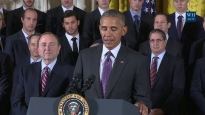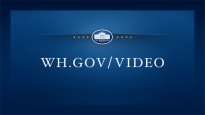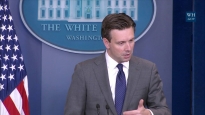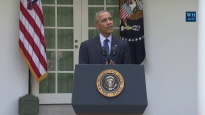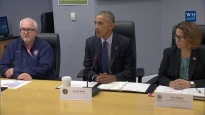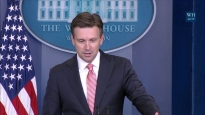President Obama Speaks to Press After Cabinet Meeting
November 23, 2009 | 7:37
The President speaks to members of the press at the conclusion of his afternoon Cabinet meeting where the economy, health care legislation, and the upcoming jobs summit were discussed. November 23, 2009. (Public Domain)
Remarks by the President after Meeting with his Cabinet
3:27 P.M. EST
THE PRESIDENT: Hello, everybody. I assembled my Cabinet today for updates on progress we've made across several areas. Secretary Gates and Secretary Clinton spoke about issues of national security. Peter Orszag had some discussion of our upcoming budget. And I updated the Cabinet on the progress that we're making on the health insurance reform legislation that's moving its way now through the Senate, and reiterated the urgent need for us to get to the finish line and provide relief, both in terms of costs and the quality of coverage that Americans are getting in their health care.
The primary focus of our discussion today, though, had to do with the same thing that Americans sitting across kitchen tables all across the country are focused on, and that is jobs and the economy.
If you look back at where we've been, in the first several months of my administration, because of the steps taken by people like Secretary Geithner and the rest of our economic team, we were able to stabilize the financial system and ensure that the economy didn't slip back into a depression. And we take this for granted now, but it is something that I think all the members of the Cabinet who participated are extremely proud of.
Since that time, we've passed a Recovery Act that's put a middle-class tax cut into people's pockets, that has invested in infrastructure all across this country and put people back to work, and something that isn't noted often enough, has helped stabilize state budgets at a time in which we could have seen hundreds of thousands of layoffs in teachers and police officers and firefighters.
Our economy is growing for the first time in more than a year, and we know that economic growth is a prerequisite for job growth. But, having said that, what I emphasize today is we cannot sit back and be satisfied, given the extraordinarily high unemployment levels that we've seen. We have only taken the first step in curing our economy and making sure that it is moving on the right track. And I will not rest until businesses are investing again and businesses are hiring again and people have work again.
Now, this is going to be a challenging task. It's challenging because of the extraordinary blow that the financial crisis delivered to the economy as a whole. It is particularly difficult because both the financial sector and the housing sector were the biggest drivers of economic growth prior to the financial crisis, and so the severity of their pullback means that things are moving slower than we would like them to move.
One of the ironies that we have right now is is that businesses across sectors are making profits again but their primary way of making profit has been to cut costs, as opposed to seeing increased demand. And unfortunately, the huge rise in productivity, which is normally a good thing, in this circumstance means that they have learned to produce the same amount of goods with fewer people. All these present some significant challenges in terms of us creating more jobs in this economy.
But, having said that, something that our economic team emphasized is that there are core strengths to the American economy that will put us in good stead over the long term. Having gone through this very wrenching adjustment, we continue to have the best universities in the world, the best innovation and technologies in the world. We continue to have some of the best workers in the world, the most productive workers in the world. And we have the kind of dynamism and entrepreneurship in our economy that's going to serve us well in the long term. The key is to bridge where we are now to that more prosperous future. And so a lot of the discussion, in a whole range of different sectors, was how do we move that job agendas forward.
For example, in the export area, I just came back from a trip to Asia in which one of my highest priorities was discussing how we can increase exports into that region. If we could just increase our exports by 5 percent into that region, that would mean hundreds of thousands of well-paying jobs. And there's no reason that we can't do it. In fact, it turns out that they want our products and they want our technology, but partly because of regulatory restrictions, partly because of currency issues, partly because we just haven't been as aggressive as we need to be, we haven't gotten there.
That's something that we're going to be focusing on -- on infrastructure. Although some of the payout extends beyond just a couple of years, us investing now in revamping our existing infrastructure and then starting to lay the foundation for things like high-speed rail can make all the difference in the world.
And in green technology, we are seeing some terrific ideas that could immediately put people back to work and save consumers money and help with the climate crisis that we have in place.
So, as many of you know, we're going to be having a jobs summit on December 3rd. Part of the task of this Cabinet was to generate good ideas in anticipation of that jobs summit. We are going to be bringing together people from all across the country -- business, labor, academics, non-for-profits, entrepreneurs, small and large businesses -- to explore how we can jumpstart the hiring that typically lags behind economic growth, but we don't want to wait. We want to see if we can accelerate it. And I'm confident that we're going to be able to do it because I've got as good of a Cabinet as I think any President has ever had.
Let me just close by saying this. This is a week to give thanks. And I advised this hardworking Cabinet to get a little bit of rest this week, particularly the people who have been traveling around the globe for day in and day out and don't know what time zone they're in.
But I think it's also a time to remember that this has been a very difficult year, and a lot of people out there are having a very, very tough time. And I indicated to my Cabinet that as hard as they're working and as difficult as the political environment can be sometimes, we are extraordinarily blessed to be in a position where we can make a potential difference in the lives of millions of people. We need to take advantage of that opportunity and redouble our efforts in the months and years to come.
Thank you very much, everybody.
END
3:35 P.M. EST
|
October 6, 2016
|
October 6, 2016
|
October 6, 2016
|
October 5, 2016
|
|
October 5, 2016
|
October 5, 2016
|
October 5, 2016
|
October 4, 2016
|
- &lsaquo previous
- …
- 16
- 17
- 18
- 19
- 20
- 21
- 22
- 23
- 24
- …
- next &rsaquo
